In Search of a Christian Nation
Ronald B. Flowers July/August 2004
Getting your Trinity Audio player ready...
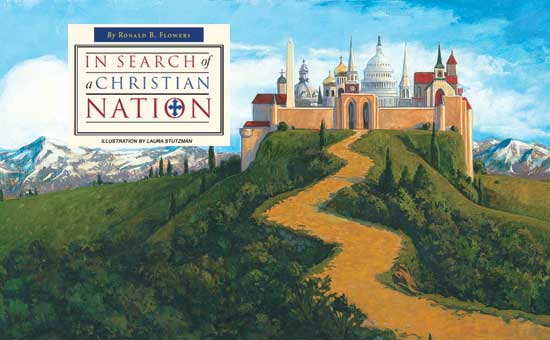
Here are some of the statements they use to support their position. "The religion of the First Amendment is traditional theism and, in particular, Christianity." The government rested "squarely on Christian principles. . . . The Constitution was designed to perpetuate a Christian order." Others speak of the Judeo-Christian tradition as the basis of the country. "Our values as a free people and the central values of the Judeo-Christian tradition are flesh of the flesh, blood of the blood. . . . We should not deny what is true: that from the Judeo-Christian tradition come our values, our principles, the animating spirit of our institutions." Others refer to the "biblical" base of American government.
What motivates these claims of a Christian character for the nation? A great imperative comes from a desire to combat the perceived moral degeneracy of our time. In its early days our nation was more Christian and presumably more moral. That provides an appropriate golden age to which we ought to return. James Kennedy, minister of the Coral Ridge Presbyterian Church in Fort Lauderdale, Florida, and an ardent advocate of the Christian nation idea, said in March 1998: "There is nothing more powerful than an idea whose time has come. And the idea of reclaiming America for Christ has definitely come." Challenging Americans to adopt an improved national moral lifestyle is a laudable task, and squarely within the Christian mandate. But it is based on a false premise, for the Christian nation idea is wrong.
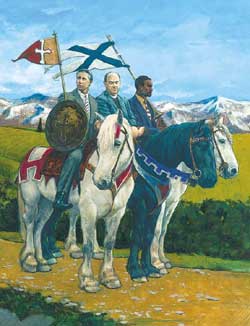
A companion argument is that the Founders, those who wrote the Constitution, were Christian and intended to create a Christian nation. But that is overstated, as well. Many of the Founders were not Christian. They were, of course, not atheists, either. They were rationalists, not Christian in any narrow or confessional sense. Some were Christian, but the body of the authors of the Constitution agreed that the document was to be a secular document, very supportive of religion, but not one that made Christianity or any other religion the religion of the republic.
"The political convictions of the men who struggled to ratify a 'godless' Constitution were not products of personal godlessness. Far from it! Almost everyone who participated in the debates about the Constitution shared a concern about the health of religion. . . . Many of the men who championed the godless Constitution stayed aloof from dogmatic forms of Christian faith, but most of them believed in a God who rewarded good and punished evil in an afterlife. They respected the moral teachings of Christ and hoped that they would prosper among Americans and in the churches that Americans attended."
They wrote a secular Constitution because they believed government should not be involved in matters of conscience.
Certain historical facts confound the arguments of contemporary sacred-nationers. One is that even during the time of the debates over ratification of the Constitution, many bitterly opposed ratification because the Constitution was not Christian enough. The secular nature of the Constitution did not escape the notice of many orthodox Christians of the time, and they opposed it on those grounds. How can latter-day Christian-nation advocates support their claims if people contemporary to the Constitution recognized that it was not a Christian document even as they adopted it?
In 1797 the United States finalized a nonpiracy treaty with Tripoli. Most of the articles have to do with the safety of shipping in the
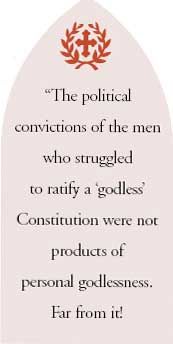
The Civil War caused a flurry of efforts to amend the Constitution to make this a Christian nation. "The Civil War, so it seemed to thousands of religious Americans, was God's punishment, not only because of slavery, but because He was omitted from the Constitution." The National Reform Association (NRA) sponsored an effort to rewrite the preamble of the Constitution to assert that America was a Christian nation. The NRA appealed to President Lincoln to support its movement, and then introduced its language as a bill in Congress. In both cases the initiative was unsuccessful. It tried again in 1894 and 1910, with the same result. The failure of this initiative in the late nineteenth century raises the question: If the modern sacred-nationers are right that we have always been a Christian nation, why was the NRA effort possible? The answer, of course, is that the modern sacred-nationers are not correct.
Christian-nation advocates often cite the Supreme Court case Holy Trinity Church v. United States to support their argument. It was a case about whether the government could penalize a church for hiring a minister from another country, in violation of laws prohibiting importation of immigrants under employment contracts. The Court, in an opinion written by Justice David J. Brewer, found in favor of the church. Congress intended the law to prohibit the importation of people who would work at the lowest level of salary. Congress had not envisioned the law would prohibit the hiring of "ministers of the gospel, or, indeed, of any class whose toil is that of the brain." The law applied "only to the work of the manual laborer, as distinguished from that of the professional man."
That would have been enough to decide the case. But Brewer went further. He held that it was inappropriate for the government to prohibit a church from hiring an immigrant minister because this is a Christian nation. He cited colonial charters and state constitutional language and concluded: "These, and many other matters which might be noticed, add a volume of unofficial declarations to the mass of organic utterances that this is a Christian nation. In the face of all these, shall it be believed that a congress of the United States intended to make it a misdemeanor for a church of this country to contract for the services of a Christian minister residing in another nation?"
Sacred-nationers have henceforth cited this statement as convincing proof that this is a Christian nation. Yet their evidence is less than clear. Brewer, in his opinion, did not define what he meant by the phrase. Furthermore, in his other writings on the subject, of which there are several, he elaborated in a way that shows he did not mean that America is legally a Christian nation. He was speaking more of the history of Christianity in America and the appreciation of Christianity by Americans. Furthermore, the Christian character of America meant the separation of church and state and the appreciation for religious diversity, not trying to impose any religion on the population by law. In recognition of this he wrote: "No one is in duty bound as a citizen to attend a particular church service, or indeed any church service. The freedom of conscience, the liberty of the individual, gives to every individual the right to attend or stay away."
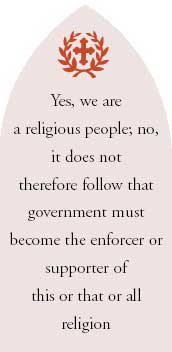
The separation of church and state was a characteristic of a Christian nation for Justice Brewer: "Indeed, the very fact that [America] has no Established Church makes one of its highest credentials to the title of a Christian nation. The greatest thought of the Master was that over the human soul there was no earthly sovereign."
Many current evangelical Christians agree with Justice Brewer on this last point. Intensive research among evangelicals between 1995 and 1997 reveals that most of them do not think of the Christian nation concept as Christian imperialism seeking to dominate the country. Nearly 40 percent believed that the Founders had created a nation in which religious freedom was available to all. That was what made this a Christian nation. "When evangelicals think of 'Christian America' in this way, they are . . . tapping a historical tradition of freedom and choice that reinforces the value of religious pluralism and liberty. . . . This meaning of 'Christian America' functions more to bolster liberal toleration than religious domination."
The next most frequent understanding of evangelicals was that America is Christian in a historical way, i.e., that Christianity has had a significant role in the lives of Americans, more in the past than today. So, for some 35 percent of evangelicals surveyed, "the majority of faithful Christians' definition does not recommend a Christian Right agenda. They offer it simply as a matter-of-fact, empirical description of the past."
Although some did believe that the government and laws of the country do reflect a Christian character, the surveyors found that "most evangelicals do not even want Christianity to be America's established religion—much less want America to be a formal Christian state. They fully believe in the American system of liberal, representative democracy. A careful reading of our interview discussions reveals that many interviewees defined 'Christian nation' in terms of representative government and balance of powers."
This means that the majority of evangelicals do not pay attention to or believe the Christian nation claims of the leaders of the Religious Right. This, incidentally, was also a finding of this extensive survey.
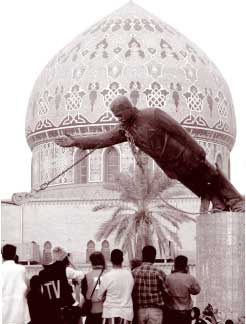
"However much honor is given to these and other founding fathers, we must not forget believers such as [William] Penn and [Roger] Williams who would defend liberty of conscience because religion was too precious a commodity to be bought and sold, or traded to the highest bidder, or surrendered to the strongest sword. . . . Yes, we are a religious people; no, it does not therefore follow that government must become the enforcer or supporter of this or that or all religion. . . . What good deed can government do for religion? The best deed of all: leave it free and unencumbered, burdened by neither enmity nor amity."
"The creation of a godless constitution was not an act of irreverence. Far from it. It was an act of confidence in religion. It intended to let religion do what it did best, to preserve the civil morality necessary to democracy, without laying upon it the burdens of being tied to this or that political faction. The godless Constitution must be understood as part of the American system of voluntary church support that has proved itself a much greater boon to the fortunes of organized religion than the prior systems of church establishment ever were. . . . The framers of the Constitution knew perfectly well their predecessors' beliefs about the necessity of enforcing religious orthodoxy to preserve social peace. But they committed themselves and the United States to another option—one that recognized that social peace and personal happiness are better served by separating religious correctness from public policy. The success of what they proposed should still fill us with amazement and with gratitude."
___________________________
Ronald B. Flowers is John F. Weatherly Professor of Religion Emeritus, Texas Christian University, Fort Worth, Texas.
___________________________
1 John H. Whitehead and John Conlan, "The Establishment of the Religion of Secular Humanism and Its First Amendment Implications," Texas Tech Law Review 10 (1978): 2.
2 Russ Walton, One Nation Under God (Old Tappan, N.J.: Fleming H. Revell Co., 1980), pp. 16, 23.
3 William J. Bennett, address to the Knights of Columbus (delivered Washington, D.C., Aug. 7, 1985), pp. 9, 12. Unpublished.
4 See Tim LaHaye, Battle for the Mind (Old Tappan, N.J.: Fleming H. Revell Co., 1980), pp. 37, 38; Jerry Falwell, Listen, America! (Garden City, N.Y.: Doubleday and Co., 1975), pp. 16, 27.
5 Christian Smith, Christian America? What Evangelicals Really Want (Berkeley: University of California Press, 2000), p. 21. (Italics supplied.) The statement was made at a Reclaiming America for Christ conference hosted by Kennedy's church.
6 For a detailed refutation of the Christian nation argument, see the two-part article by Stephen M. Stookey, "In God We Trust? Evangelical Historiography and the Quest for a Christian America," Southwestern Journal of Theology 41 (Spring 1999): 41-69; (Summer 1999): 5-37. In spite of being published in a relatively obscure journal with careless proofreading, this is a fine article, worthy of attention. See also Mark A. Noll, Nathan O. Hatch, and George M. Marsden, The Search for Christian America (Colorado Springs: Helmers and Howard, expanded edition, 1989). These three evangelical historians make powerful arguments against the Christian nation concept.
7 Isaac Kramnick and R. Laurence Moore, The Godless Constitution: The Case Against Religious Correctness (New York: W. W. Norton, 1997), p. 44. See also Ronald B. Flowers, "On Preserving the Separation of Church and State," Lexington Theological Quarterly 24 (October 1989): 110, 111; and Edwin S. Gaustad, Faith of Our Fathers: Religion and the New Nation (San Francisco: Harper and Row, 1987). A revised edition of this book was published under the title Neither King nor Prelate: Religion and the New Nation 1776-1826 in 1993 by Eerdmans Publishing Company.
8 Kramnick and Moore, pp. 26-45.
9 Treaties and Other International Acts of the United States of America, Volume 2, Documents 1-40; 1776-1818, edited by Hunter Miller (Washington: United States Government Printing Office, 1931), pp. 364-366. For the context of the treaty, see Rob Boston, "Joel Barlow and the Treaty With Tripoli," Church and State 50 (June 1997): 11-14; and Morton Borden, Jews, Turks, and Infidels (Chapel Hill, N.C.: University of North Carolina Press, 1984), pp. 76-79.
10 David Barton, one of the most ardent of Christian nation advocates, on his Web site attempts to show that the Treaty of Tripoli does not deny the Christian nation concept. He does not succeed. See www.wallbuilders.com/resources/ search/detail.php?ResourceID=5.
11 Borden, Jews, Turks, and Infidels, p. 61.
12 The proposed language was: "We, the people of the United States, humbly acknowledging Almighty God as the source of all authority and power in civil government, The Lord Jesus Christ as the Governor among the Nations, and His revealed will as of supreme authority, in order to constitute a Christian government . . . do ordain and establish this Constitution for the United States of America."
13 Kramnick and Moore, p. 146.
14 Kramnick and Moore, pp. 144-149; Borden, pp. 58-74. Holy Trinity Church v. United States, I43 U.S. 457 (1892). The following analysis is based on Steven K. Green, "Justice David Josiah Brewer and the 'Christian Nation' Maxim," Albany Law Review 63 (1999): 427-476.
15 143 U.S. 457, p. 463.
16 143 U.S. 457, p. 471.
17 David J. Brewer, The United States, a Christian Nation (Philadelphia: John C. Winston Co., 1905), p. 54; Green, p. 458.
18 David J. Brewer, "Address at the Dedication of the New Building at the Normal School," Emporia Gazette (June 25, 1880), p. 29 (transcript in the Brewer family papers collection at Yale University); p. 461.
19 David J. Brewer, American Citizenship (New York: Scribner's, 1902), pp. 21, 22; Green, p. 461.
20 "Intensive research" means not just mail or telephone questions, but extensive conversation with self-identified evangelicals. See Smith, p. 2.
21 Ibid., pp. 26, 27.
22 Ibid., pp. 27, 28.
23 Ibid., p. 29.
24 Ibid., p. 7. On that page Smith says: "A most common error that observers of evangelicals make is to presume that evangelical leaders speak as representatives of ordinary evangelicals. In fact, evangelical leaders do not simply give voice to the thoughts and feelings of the millions of ordinary evangelicals. Nor do ordinary evangelicals simply follow whatever their leaders say—assuming that they even listen to them much."
On page 26 he notes: "What is most interesting, however, is to pay close attention to what these evangelicals mean by 'Christian nation.' For when one hushes the rhetorical echoes of the James Kennedys and Pat Robertsons, and refrains from projecting Christian Right discourse onto the speech of ordinary evangelicals, one notices a tremendous variety of meanings attached to the phrase 'Christian America,' many of which have little if anything to do with organizing a Christian control of American culture and society."
25 Gaustad, pp. 27, 138, 137.
26 Kramnick and Moore, pp. 24, 177.